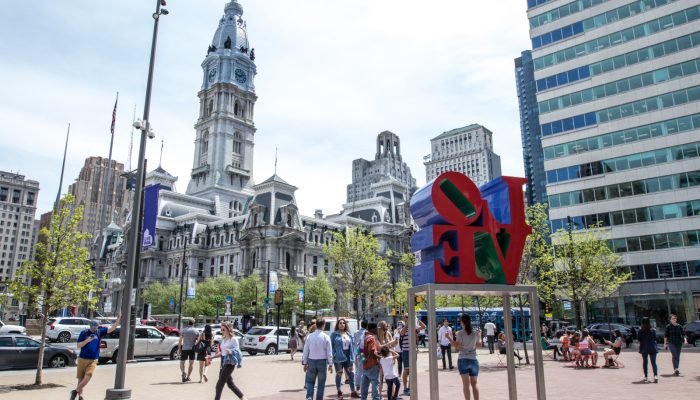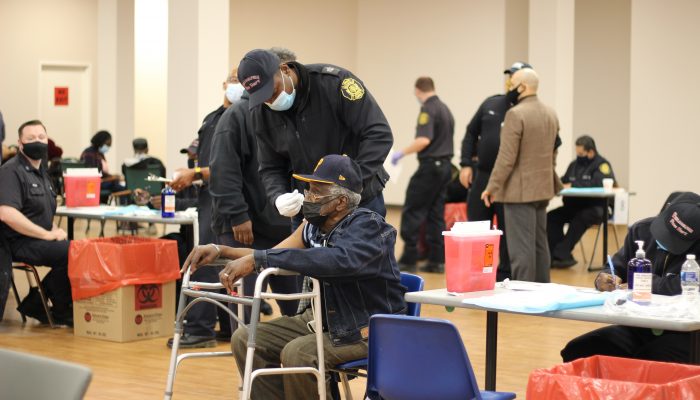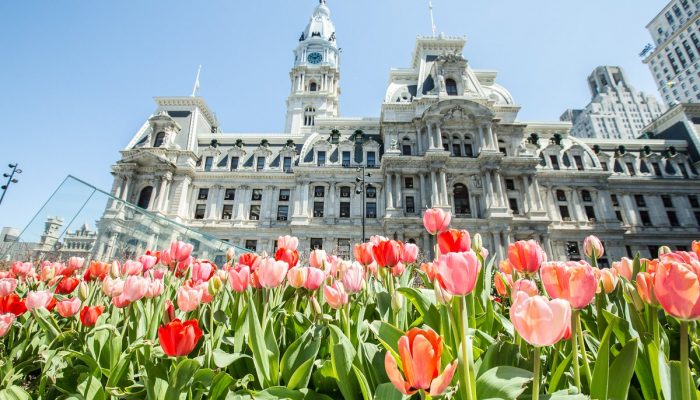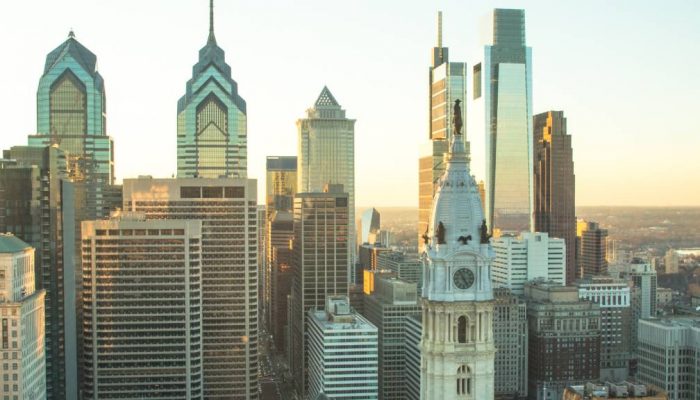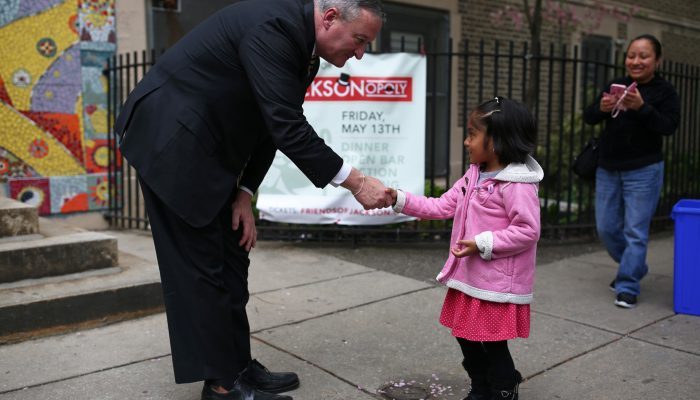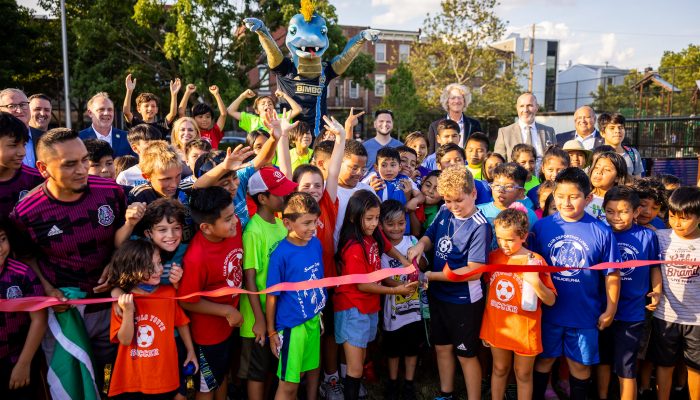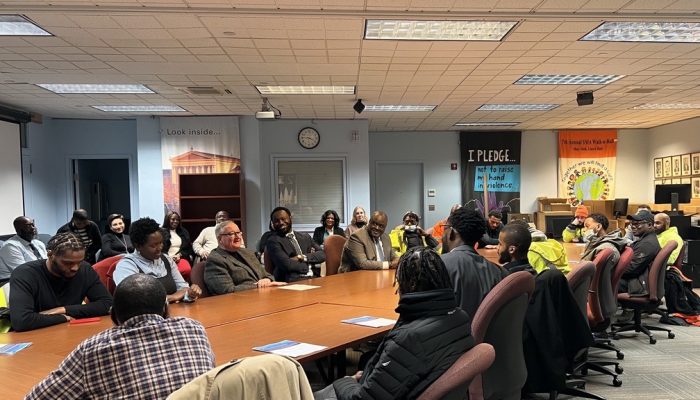Today, Mayor Kenney presented his seventh proposed Five Year Financial Plan, covering Fiscal Years 2023-2027.
Over the past two years, the City, along with all of our partner organizations across the region, stepped up to provide unprecedented support for our people in a time of great need.
Philadelphia’s FY23 Budget and Five Year Plan build on all of these efforts so that Philadelphians in every neighborhood can benefit from a strong, inclusive recovery.
A budget by Philadelphians, for Philadelphians
As we prepared this year’s budget proposal, the City held the most comprehensive public engagement process ever regarding City spending.
We held over 20 community engagement sessions with more than 500 residents and City employees. Residents, business owners, non-profits, arts and culture organizations, and frontline City employees participated in our engagement sessions, offering insight into Philadelphia’s needs and vision for our city, which we used to create our FY23 budget.
Building off of that input, over the next five years, this budget plan will move Philadelphia forward by:
- Enhancing core services that people depend on.
- Accelerating inclusive economic growth across the city.
- Maintaining the City’s long-term fiscal health.
- Continuing to reduce racial disparities so that race is not a determinant of success and wellbeing for every single person that calls Philadelphia home.
An integral part of our Five Year Plan is the roughly $1.4 billion the City is receiving from the American Rescue Plan (ARP). This one-time federal relief helps ease the effects of projected revenue declines stemming from the pandemic.
Below are some highlights from the FY23 budget proposal and the Five Year Plan.
Investing in quality education for all Philadelphians
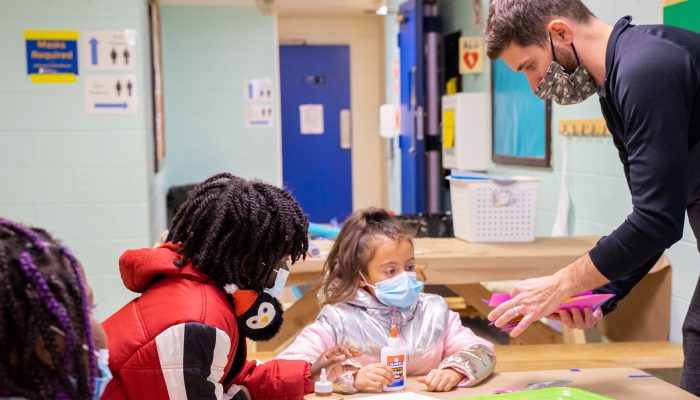
School District of Philadelphia
Mayor Kenney is building on the historic commitments to public education that he has made over his two terms by investing nearly $1.4 billion over the life of the FY23-27 Five Year Plan in the School District of Philadelphia, in addition to local tax revenues that support the District. FY23 includes $270 million in funding for the School District of Philadelphia. This funding is in addition to $1.3 billion the School District received from the American Rescue Plan, providing critical relief and fiscal stability.
Community College of Philadelphia and Catto Scholarship
We’ll also invest more than $50 million in the Community College of Philadelphia this year, with $10.8 million dedicated to the Octavius Catto Scholarship. This program enables first-time students to attend college tuition-free, and with the supports they need like food, books, and transportation stipends to successfully earn their degree. Today, over 500 students have enrolled through this opportunity.
Free quality pre-K and Community Schools
We’ll continue the expansion of the PHLpreK program and Community Schools, supported by revenue from the Philadelphia Beverage Tax. Since launching in 2017 PHLpreK has benefited more than 10,000 children and counting. We propose 300 new slots to be funded this year, for a total of 4,300 slots, providing free and high-quality early learning services that lay a critical foundation for children and families.
Three new Community Schools in FY23 will bring the total number to 20 schools that provide community-based wraparound supports that serve a wide range of needs for students, families, and communities.
Free Library
Libraries are essential community assets offering information, connection, and educational programs to all residents, and this plan adds $48 million over five years to our investment in the Free Library, bringing the total five-year investment to $285 million.
Digital equity
The City worked with a number of partners to launch PHLConnectED — a program that has provided over 21,000 free internet connections for student households. We’ll continue to build on the success of the PHLConnectED initiative. Earlier this year, we released a 5-year Digital Equity Plan, which lays out our core strategies to build on our successes and further improve access and affordability of broadband internet and devices.
Keeping residents safe
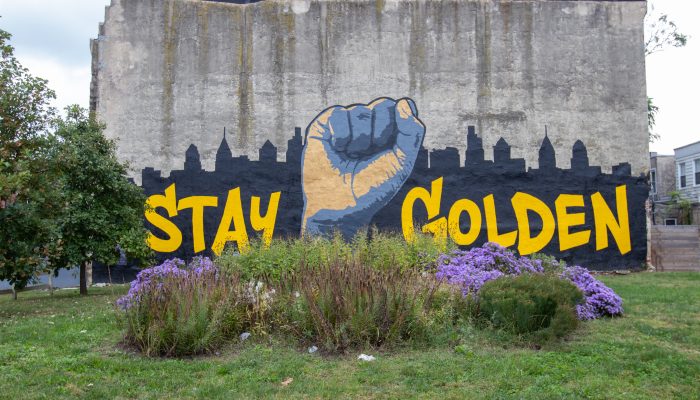
This Plan makes critical investments in the Roadmap to Safer Communities, the City’s violence prevention plan. With the full set of violence prevention investments — including long-term investments—we’re directing more than $184 million dollars to help make our communities safer and reduce violence, an 18.5 percent increase over FY22. Some of these investments include:
- $6 million to expand evidence-based programs that target those most at risk of being a victim or a perpetrator of gun violence and provide connections to services, treatment, and employment. This includes investments in the Group Violence Intervention program, the Community Crisis Intervention Program, new behavioral health supports, and the implementation of a local version of READI (Rapid Employment and Development Initiative) that will help decrease shootings among those at highest risk of gun violence.
- An additional $12 million for the Anti-Violence Community Partnership Grants (including Targeted Community Investment Grants and Community Expansion Grants), which directly funds and supports community-based organizations that are focused on reducing violence through trauma-informed healing and restorative practices in the neighborhoods most affected by violence. Our total investment in this program alone has been more than $32 million over the last two years.
- More than $3 million to enhance the Police Department’s ability to solve violent crime and modernize police tools with forensic upgrades and policy mobility, which will facilitate the use of enhanced forensic analysis in every homicide.
- $1.5 million to support community engagement, planning, and improved data analytics to ensure anti-violence programs are reaching those who need it most, and service connections are successful.
- $800,000 for violence prevention programs and supports focused on delinquent youth within the Juvenile Justice system including restorative justice programming and $1.5 million for two additional Community Evening Resource Centers for a total of four Centers operating from 7 p.m. to 2 a.m. to support Philadelphia youth who are out after a curfew.
These are just a few of our violence prevention investments. Take a deeper look at our plans and investments to make Philadelphia safer and more just.
Growing an inclusive economy and thriving neighborhoods
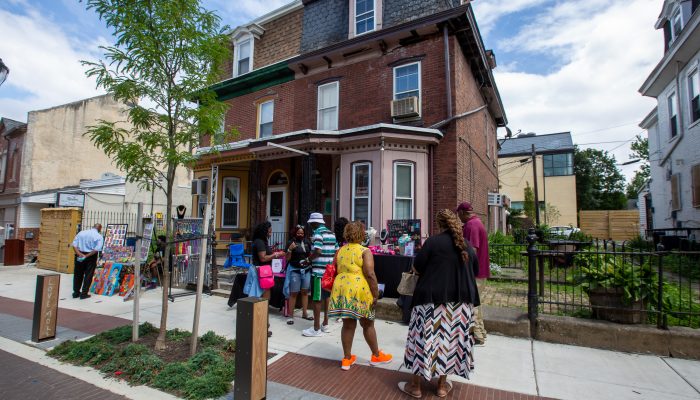
To increase efficiency, the FY23-28 Capital Budget for the Streets Department programs $27 million for paving/reconstruction of streets and ADA ramps in FY23 and $173 million over the life of the Capital Program. The FY23 Capital Budget also allocates $2.1 million for traffic control improvements and $17.7 million for the full FY23-28 program, in support of the Vision Zero initiative, to make the city’s streets safer for all users. Learn more about our investments for better, cleaner, safer streets.
Street sweeping and cleaning
The FY23 budget includes funds for 60 miles of street paving and further expansion of street sweeping. The street sweeping program will expand to 8 new neighborhoods for a total of 14. The Streets Department will also get $2 million to stand up additional crews to respond to illegal dumping.
Investing in infrastructure
The implementation of the federal Bipartisan Infrastructure Law should bring more than $1 billion for roads, bridges, transit, water infrastructure, broadband access to the City, and thousands of new jobs.
The Plan includes a $20 million investment across twelve City agencies ($116 million over the FYP) to prepare for the Bipartisan Infrastructure Law so that Philadelphia can compete successfully for federal dollars and deliver high-quality infrastructure projects that transform communities and make real the commitment to improving racial equity and growing wealth in Black and Brown neighborhoods.
Public transportation
The FY23-27 Plan increases funding of SEPTA by $9 million a year for a total of $100 million a year, a formula-based required contribution to leverage matching funds. The City will continue to work closely with SEPTA to deliver the Philadelphia Transit Plan, A Vision for 2045.
Supporting small businesses
This plan dedicates $500,000 for a new Emergency Grant Program and $7 million for the PHL Taking Care of Business Corridor Cleaning Program, which maintains neighborhood corridors as welcoming and attractive places while providing accessible job opportunities.
Maintaining and improving public spaces
During the COVID-19 pandemic, the City’s parks and recreation centers became havens in new ways as residents and visitors—many of them children—relied on the centers, trails, parks, and playgrounds for gathering with others in safe ways. The FY23 Budget invests $2.7 million in FY23 ($10.5 million over the life of the Plan) in Philadelphia Parks and Rec (PPR). These investments will allow PPR to expand hours and improve programming in the neighborhoods that need it most. The FY23 Budget also includes investments to further support progress in the Rebuild program as it reaches full stride in implementation and prepares for a high volume of projects transforming recreation centers, parks, and libraries over the next several years.
Keeping all Philadelphians healthy and housed
We must continue to work to eliminate health disparities and safeguard residents from threats that cause disease and injury.
We’re committed to ensuring that COVID-19 prevention and treatment options are available to all city residents regardless of insurance status or ability to pay.
Addressing the opioid crisis
FY23 will see the continuation of the critical work of the Opioid Response Unit to spearhead our multi-departmental effort and strengthen the City’s ability to address the ongoing opioid crisis across the city. We will invest $5.5 million ($17 million over the Five Year Plan) to maintain the suite of low-barrier emergency and permanent housing services for people who have been chronically homeless and have Opioid Use (or other substance) Disorders, plus an additional $5.1 million in FY23 to support services and safety in Kensington.
Low-barrier employment programs
The FY23 Budget includes the expansion of multiple successful low-barrier employment programs. These investments at the Office of Community Empowerment and Opportunity, the Managing Director’s Office, and the Mural Arts Program total more than $2.3 million ($10.2 million over five years) and will form a coordinated system of accessible employment opportunities with pathways to more permanent employment.
Mitigating environmental hazards
In FY23 the City will continue to advance policies and programs to mitigate environmental hazards, especially in communities of color that have disproportionately borne the costs of environmental harms. In FY22 the Office of Sustainability launched the City’s first Environmental Justice Advisory Commission, a historic step in the City’s commitment to supporting the leadership of frontline communities in addressing environmental harms. In FY23 this Commission will steer a community resilience and environmental justice grant fund and develop priorities and processes to begin making recommendations to policymakers.
The Department of Public Health will receive nearly $500,000 to continue and expand its home lead remediation program, to conduct more screenings, remediate more homes, and respond quickly to children with elevated blood lead levels to prevent further exposure and ensure the adequacy of treatment.
Housing
Safe and stable housing is a critical foundation for health. In FY23 we will invest $3.2 million, and $6.2 million over the Five Year Plan, to sustain non-congregate shelter services for seniors and $1.3 million in FY23 and $5.7 million over the Five Year Plan to address cost increases at shelters, including to increase the wages of providers of these critical services.
The Plan also makes a major investment, $27.9 million in FY23 and $144.6 million over five years, in the Housing Trust Fund for the construction of new affordable homes, the preservation and repair of existing homes, and homelessness prevention.
Building a more diverse, efficient, and effective government
In FY23 the Kenney Administration will continue and expand efforts to reshape the internal processes of government in service of Philadelphians.
Reforming fines and fees
For the past several years the City has worked to reform fines and fees that disproportionately burden Black, Brown, and low-income Philadelphians. The FY23 Budget commits $750,000 to remove the cost to participate in the Accelerated Misdemeanor Program, so that ability to pay does not determine who can participate in this program that diverts individuals from the criminal justice system.
Improving City operations through a racial equity lens
By the end of FY23, all City departments will have undergone a process to assess how their operations, policies, and budgets influence racial disparities in Philadelphia and will have also created a Racial Equity Action Plan.
And we’re making investments to create an inclusive workplace. We’re investing in hiring, training, professional development, and capacity building for one of our most important assets: City employees. We are committed to ensuring that the City’s workforce and culture are diverse, inclusive and that all City employees are supported and empowered to work to make positive changes in our city.
Using data to drive better outcomes
The City will also redouble its efforts to use data to address the most challenging problems we face, from poverty to gun violence to substance use disorder treatment, through the signing of an Executive Order elevating an Office of Integrated Data for Evidence and Action within the Managing Director’s Office and devoting additional resources to increase the use of data to drive better outcomes for Philadelphians.
Providing tax relief
The Plan proposes no tax rate increases.
We are anticipating new property assessments that reflect significant growth and may affect homeowners, other property owners, and tenants. Growing property values reflect well on Philadelphia being a place of choice and represent an opportunity to build wealth for some.
As we navigate the impacts of potentially increased real estate values, our Administration will continue to work closely with City Council on tax relief and reforms that are scaled to the magnitude of the changes as the data becomes available during the budget process.
Since the beginning of the City’s tax reduction program, we’ve decreased the Wage Tax by just over 20 percent. And since the beginning of our Administration, the value of Wage Tax cuts has totaled nearly $100 million, and Wage Tax rates overall are at their lowest level since the 1970s.
We’ve also lowered the Business Income and Receipts Tax (BIRT). Before 2016, about 130,000 businesses filed a BIRT return each year. With the City’s new $100,000 BIRT exclusion and changes to filing rules, over 95,000 businesses with Philadelphia sales no longer have a liability or a filing requirement.
Through these investments, and others, Philadelphia will work toward becoming a city where equal opportunities are open to all residents, race is not a determinant of success, and diversity is elevated as one of Philadelphia’s greatest assets.

